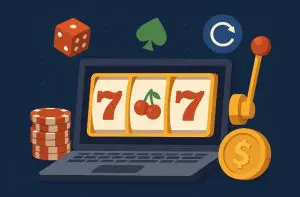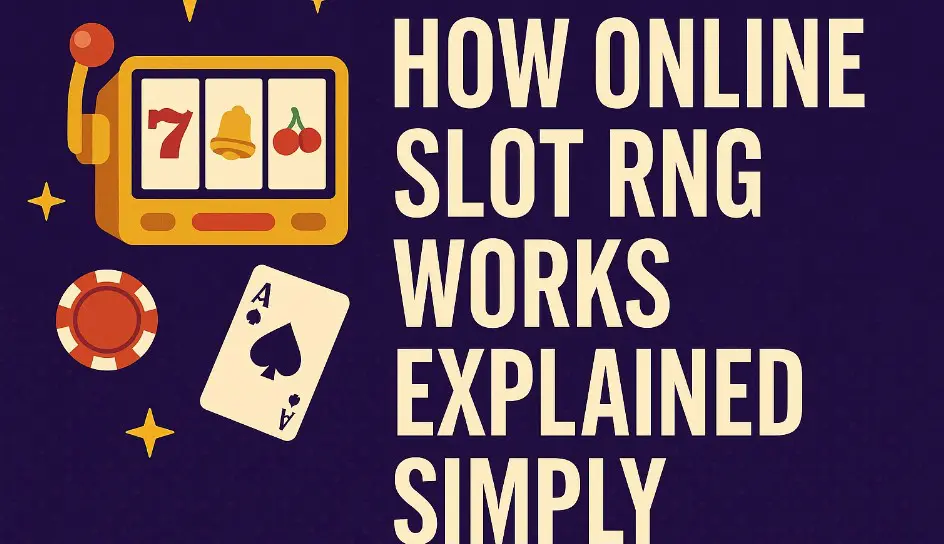Ever sat in front of your laptop, tapped that shiny spin button, and thought: “There’s no way this isn’t rigged, I’ve been spinning forever”? You’re not alone. Slot players everywhere—myself included—have stared at near-misses and streaks and wondered what’s happening behind the scenes. The truth is, it’s not magic, and it’s definitely not some casino employee deciding whether you win or lose. It’s all down to something called RNG: the Random Number Generator.
What is RNG in Online Slots?
Think of RNG as the invisible dealer in your game. You don’t see it shuffle, you don’t see it deal, but it’s running constantly in the background. Even when you’re not pressing spin, it’s producing random numbers by the thousands every second. When you finally hit spin, the software just grabs the number it’s on at that exact millisecond. That number translates into the outcome on your reels.
The best way I’ve ever explained it to a skeptical friend is by comparing it to a never-ending deck of cards being shuffled at lightning speed. You don’t stop the shuffle—you just take a snapshot at a random moment. Sometimes you catch a winning combo, sometimes it’s a dud, but the shuffle never cares what came before.
How Does Random Number Generation Work?
It’s not magic dust. RNG in online slots is usually a pseudo-random number generator, or PRNG. It starts from a “seed” (often a timestamp or other system value) and then generates a crazy-fast sequence of numbers. Each number is mapped to a symbol on a reel.
Here’s the funny part: even if you hit spin one millisecond earlier or later, you’d probably get a completely different outcome. I once tested this by hitting spin twice in quick succession—barely a blink apart—and the results couldn’t have been more different. That’s how sensitive it is to timing.
Types of RNG: True vs. Pseudo
There are two main versions:
- True RNG (TRNG): randomness pulled from physical events, like radio static or atmospheric noise.
- Pseudo RNG (PRNG): randomness created by an algorithm and a seed value.
Online slots almost always use PRNG. Why? It’s fast, efficient, and—when properly tested—indistinguishable from true randomness for players. Regulators demand robust PRNG because it’s practical for massive online casinos running thousands of games simultaneously.
Why RNG Matters for Slot Fairness
Without RNG, trust in slots would collapse. Every spin is independent, with no memory of the last one. That’s why you can technically hit back-to-back jackpots (rare, but possible) or get nothing but lemons for an hour. Probability doesn’t care about your feelings.
I remember a friend insisting his slot was “warming up” after a long cold streak. He was convinced a payout was imminent. Spoiler: it wasn’t. The RNG didn’t know he’d lost 30 spins in a row, and it didn’t care. Each new spin had the same odds as the first.
How RNG Ensures Unbiased Outcomes
Imagine flipping a coin. Ten heads in a row doesn’t increase the odds of tails next flip—it’s still 50/50. Slots work the same way. The RNG ensures that the odds don’t shift just because of past results. It’s impartial to your win-loss record, and that’s what makes the whole system credible.
Misconceptions: Can Slots Be Rigged?
Let’s clear the air: in regulated casinos, no one is secretly pulling strings to tighten the game when you’re on a hot streak. Once a slot passes testing and is certified, the operator can’t just tweak payouts on a whim. Any changes require going back through a certification process. Independent auditors like eCOGRA and GLI keep casinos honest. Sure, shady unlicensed sites might mess with things, but reputable operators can’t afford that risk.
The Role of Certification and Game Testing
I’ll be honest: before I dug into this stuff, I thought those little logos at the bottom of casino sites were just decoration. Turns out they’re vital. Those seals from eCOGRA, iTech Labs, or GLI aren’t marketing fluff—they’re proof a game has been tested for fairness.
Labs simulate millions of spins to see if results align with the advertised RTP. If the game says it has a 96% RTP, the lab checks that over the long run, the payouts land in that neighborhood. That’s not something a casino can fake without getting caught.
Regulatory Bodies and Certification Labs
If you’ve played in a UK-licensed casino, the UK Gambling Commission stands behind the testing. In Malta, it’s the MGA. And then the labs—eCOGRA, GLI, iTech Labs—run deep statistical tests. They’re the reason you can trust that when you press spin, the outcome is random, not rigged.
RTP, Volatility, and Player Trust
Here’s the kicker: RNG guarantees fairness, but fairness doesn’t mean generosity. Developers design games with specific RTP (usually 94%–97%) and volatility. A high-volatility slot feels like a rollercoaster—long dry spells with occasional massive wins. Low-volatility slots give smaller, frequent payouts. Both are fair, thanks to RNG, but they feel wildly different. I personally like medium-volatility games—enough excitement without waiting forever for a payout.
RNG and Slot Game Mechanics Explained

Now let’s tie RNG back to the flashy stuff you actually see on screen.
Paylines, Reels, and Symbols
When you hit spin, RNG assigns symbols to each reel. The paytable checks if those symbols line up on a payline. Sometimes it’s a win, sometimes it’s a near-miss. I once landed two jackpot symbols with the third just one row above the payline. Felt brutal, but that’s probability at work—not the casino taunting me.
Bonus Features and Random Events
The same applies to free spins, scatter symbols, and bonus rounds. Whether three scatters show up is entirely random. There’s no hidden meter filling up. I know players who swear the game “teases” them, but it’s just chance. Near-misses feel personal, but RNG doesn’t play mind games—it’s cold math.
Demonstrating Transparency in Slot Games
Casinos know players worry about fairness. That’s why many now publish RTP info, audit reports, or even monthly payout percentages. It’s their way of saying, “Hey, don’t just take our word for it—here’s the data.”
Audits and Independent Testing
Some casinos go further and publish independent audit reports. These reports show actual payout percentages across all games, compared against theoretical RTP. If the numbers align, it’s proof RNG is working as intended. Personally, I like casinos that make this info public—it feels like they’ve got nothing to hide.
Frequently Asked Questions About Slot RNG
Do casinos control when slots pay out?
Nope. RNG outcomes are independent and certified. Casinos can’t “flip a switch” to drain your balance.
Why do I sometimes hit endless losing streaks?
Because randomness is, well, random. Cold streaks happen just like winning streaks. The system doesn’t balance them out on purpose.
Can anyone predict slot outcomes?
No way. Even if you recorded a million spins, the next spin would still be unpredictable. RNG doesn’t follow patterns players can exploit.
How can I tell if a slot is fair?
Stick to licensed casinos that display certifications and RTP info. Trustworthy ones rely on independent testing labs.
What’s the difference between RNG and RTP?
RNG governs each individual spin. RTP describes the long-term payout percentage over millions of spins. They’re related, but not the same thing.


